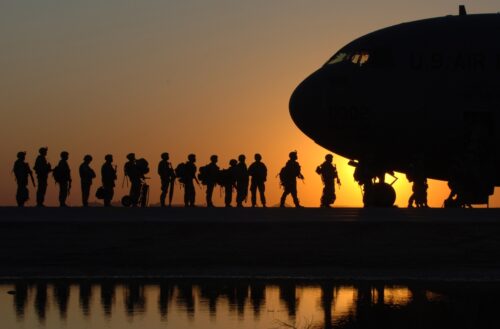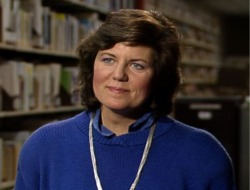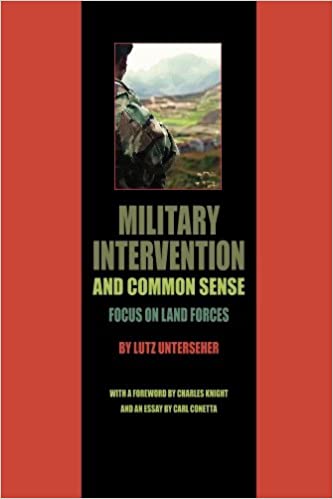Publications
Iraq Withdrawal (an interview of Charles Knight)
Quickly, Carefully, and Generously: The Necessary Steps for a Responsible Withdrawal from Iraq
Symposium: The Role of Force & the Armed Forces in US Foreign Policy — What have we learned?
- Andrew Bacevich, “The Origins and Demise of the Bush Doctrine of Preventive War”
- Carl Conetta, “Out from the House of War: A Litmus for New Leadership in Security Policy” (printable .pdf)
- David Gold, “How Much Defense Can We Afford? (printable .pdf), as republished in Challenge (Sept/Oct 2008)
A Prisoner to Primacy
Cul de Sac: 9/11 and the Paradox of American Power
What Next for Iraq?
Ideas, Homework, and Message – a testament to Randall Forsberg’s contribution to disarmament
by Charles Knight, Common Dreams, 14 January 2008. ➪ HTML
Randall “Randy” Watson Forsberg was best known as the creator of the proposal for a Nuclear Freeze, an idea that blossomed into a movement in the early 1980s. In today’s political culture, she would be thought of as a great messenger. What made Forsberg’s message powerful is its foundation in rigorous research and analysis.
Military Intervention and Common Sense: Focus on Land Forces
by Lutz Unterseher, Berlin-Greifswald: Ryckschau, 2008. Foreward by Charles Knight. Includes a chapter by Carl Conetta, Helicopters in the US wars since 9/11. PDF | order paperback
[from the Foreward]
“This book…makes a major contribution to undoing the confusion for one class of increasingly likely 21st Century uses of military force. That is, internationally sanctioned military intervention using greater force than traditional peace-keeping and less than ‘war-fighting’.”
A Note on the State of Israel
U.S. Out of Iraq How?
Toward a Sustainable US Defense Posture: An Option to save $60+ Billion Over Five Years
Is Worry about Pakistani Nukes Serving to Keep the U.S. in Iraq?
(HTML version) by Charles Knight, PDA commentary, July 2007.
War and Poverty, Peace and Prosperity
Congressional withdrawal plans, permanent bases in Iraq, increase in ground troops
Unified Security Budget for the United States, FY2008
America speaks out: Is the United States spending too much on defense?
US aid to Somalia, counterterrorism in Horn of Africa, results and motivations of terrorism
Experts give poor grades to expected defense budget proposal
No good reason to boost Army, Marine Corps end strength
US aid to Afghanistan, Taliban in government, Afghan casualties, permanent bases in the Mideast
Resolving Iraq: Progress depends on a short timeline for US troop withdrawal
(printable PDF version) by Carl Conetta, PDA Briefing Memo #40, 18 January 2007. The memo argues that the large-scale US military presence in Iraq makes sustainable progress toward peace and stability there impossible. It advances an alternative approach to stabilizing Iraq that hinges on a short timeline for US troop withdrawal and a new international effort including Iraq’s neighbors.
A Troop Surge Can’t Win a Victory from a Bad Decision for War
(HTML version) by Carl Conetta, PDA Commentary in Common Dreams, 10 January 2007.
The Near Enemy and the Far: The Long War, China, and the 2006 US Quadrennial Defense Review
by Carl Conetta, 01 November 2006. ➪ HTML ➪ PDF. An edited version of this analysis appeared in the July 2006 issue of the World Policy Journal with the title Dissuading China and Fighting the ‘Long War’ (PDF).

The 2006 US Quadrennial Defense Review advanced two new strategic vectors for the US armed forces – one targeted a putative “global Islamic insurgency,” the other put America on a collision course with China.
Outside View: How Bush Strategy Failed
War & Consequences: Global Terrorism has Increased Since 9/11 Attacks
(HTML version) (printable PDF version) by Carl Conetta, PDA Briefing Memo #38, 25 September 2006. The memo analyzes the change in the incidence of terrorism since 11 September 2001, finding a distinct increase. It also summarizes the findings of various studies on the relationship between the Iraq war and terrorism which show that in the words of one, the Iraq war “has reinforced the determination of terrorists who were already committed to attacking the West and motivated others who were not.”
Report of the task force on a Unified Security Budget for the United States, FY2007
Our Indefensible National Security Budget
Losing Hearts and Minds: World Public Opinion and post-9/11 US Security Policy
(HTML version) (printable PDF version) by Carl Conetta, PDA Briefing Memo #37, 14 September 2006. Reviews the change in global public opinion regarding US security policy since 9/11. It finds that opinion has turned strongly against US leadership, to the benefit of Russia, China and radical Islam.


